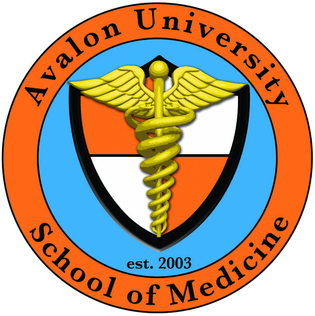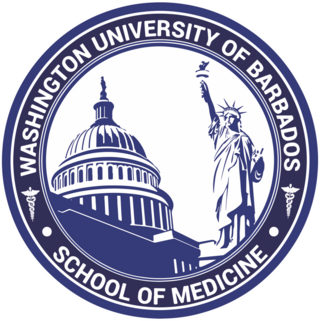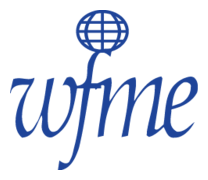Related Research Articles

The University of the West Indies (UWI), originally University College of the West Indies, is a public university system established to serve the higher education needs of the residents of 18 English-speaking countries and territories in the Caribbean: Anguilla, Antigua and Barbuda, The Bahamas, Barbados, Belize, Bermuda, British Virgin Islands, Cayman Islands, Dominica, Grenada, Guyana, Jamaica, Montserrat, Saint Kitts and Nevis, Saint Lucia, Saint Vincent and the Grenadines, Trinidad and Tobago, and Turks and Caicos Islands. Each country is either a member of the Commonwealth of Nations or a British Overseas Territory.

Instituto Tecnológico de Santo Domingo —or Santo Domingo Institute of Technology, is a private university located in Santo Domingo, Dominican Republic. It was founded on October 9, 1972, by a group of connoted professionals and is considered the best institute of technology in the country.
The Foundation for Advancement of International Medical Education and Research (FAIMER) is a nonprofit organization whose mission is to "support the Educational Commission for Foreign Medical Graduates (ECFMG) as it promotes international health professions education through programmatic and research activities." These activities include:
The American University of Integrative Sciences (AUIS), is a private for-profit offshore medical school with a single campus located in Barbados. Founded in 1999, it was formerly known as the University of Sint Eustatius School of Medicine (USESOM). For a period, the school was based in Sint Maarten, where it was taken over by IEMR LLC, a US-based company. Since October 2017, AUIS has operated in Barbados, and it is currently a candidate for accreditation by the Caribbean Accreditation Authority for Education in Medicine and other Health Professions (CAAM-HP).
Saint James School of Medicine (SJSM) is a private for-profit offshore medical school with two basic science campuses, one in British Overseas Territory of Anguilla, and the other in Saint Vincent and the Grenadines, it is considered one school with two campuses. Saint James confers upon its graduates the Doctor of Medicine (M.D.) degree.

Spartan Health Sciences University is a private, for-profit medical school located in Vieux Fort, Saint Lucia, in the Caribbean. Spartan confers upon its graduates the Doctor of Medicine (MD) degree. Spartan graduates can practice medicine in 46 US states. Spartan ceased operations in 2024 after the loss of its accreditation.
The Accreditation Commission on Colleges of Medicine (ACCM) is an international medical review and accreditation agency service for medical schools.

Avalon University School of Medicine (AUSOM) is a private medical school located in Willemstad, Curaçao, in the Caribbean. AUSOM confers upon its graduates the Doctor of Medicine (MD) degree. Administrative offices for the university are located in Youngstown, Ohio.
Destiny University was an offshore private medical school located in Rodney Bay, Saint Lucia. The school's offshore office was located in Butte, Montana. It began operations in 2001 as the College of Medicine and Health Sciences, St. Lucia, under which name it operated until 2008. Then it re-opened at 2013 still as the College of Medicine and Health Sciences, St. Lucia. The Destiny Group of Companies intended to build a new facility for the university in Vieux Fort, which would be fully operational by 2010. When the school began session in 2008, it was functioning as a "distance learning university" in the former Sandy Beach Hotel. The school operated until 2013, at which time it temporarily ceased operations and it re-opened that same year.
American International Medical University (AIMU) is an offshore medical school located on the Caribbean island of St. Lucia. It operates a School of Medicine and a School of Nursing. It partners with universities and hospitals in the United States including Washington Adventist University (WAU) in Takoma Park, Maryland for independent support programs and offers joint classes with WAU for the AIM-U Premedical Science Program on the WAU campus. Future AIM-U programs on the WAU campus may include BSN Completion and Introduction to Clinical Science, as well as the opportunity for AIM-U students to complete the WAU MBA program.

Texila American University (TAU) is an offshore private medical school, owned by the Texila American University Ltd – Hong Kong (TAU-HK). TAU-HK is a project of the ALLTERE Education Management Company. Texila's U.S. offices are in New Jersey. The University is located in Guyana, South America and offers undergraduate and postgraduate degrees in medicine, nursing, public health and allied sciences.
An offshore medical school is a medical school that caters "primarily to foreign students, wishing to practice medicine in the US and Canada" according to the World Bank, compared to local schools that focus on their home nation. Such schools are chiefly located in the Caribbean basin, but also includes schools in other locations, such as Mexico and Australia, which run programs that target American students.

Trinity Medical Sciences University is an offshore private medical school with its Basic Science part of the MD program, Pre-Medical program and Masters program located in Saint Vincent and the Grenadines in the Caribbean and Clinical Science part of the MD program in Warner Robins, Georgia, United States. It opened in 2008 as a fully accredited medical facility to respond to a shortage of physicians in the United States and Canada. It has its administrative headquarters in Roswell, Georgia, and it partners with Milton Cato Memorial Hospital located in Kingstown and Northwest Hospital in Baltimore.
University of Science, Arts and Technology (USAT) is an offshore private medical school located near Olveston, Montserrat. The university opened in 2003 with administrative headquarters in Colorado and its campus located in Montserrat. The school has graduates practicing in both the United States and worldwide and admits both domestic and foreign students.

Atlantic University School of Medicine (AUSOM) was an offshore private medical school, located in St. Lucia from its foundation in 2010 until August 2017 and then for 5 months in St. John's, Antigua and Barbuda until December 2017, when it fully closed.

Washington University of Barbados (WUB) is a defunct medical school which opened in 2017 and closed the following year. The for-profit university received a charter from the Barbados Ministry of Education in 2016, but was unaccredited. Allegedly part of an international scam in which 200 students from India were conned out of ₹25 crore, the CEO and director of the school were arrested by the Royal Barbados Police and charged with fraud in 2018.

World Federation for Medical Education (WFME) is a non-governmental organisation concerned with education and training of medical doctors worldwide. WFME's main objective is to "enhance the quality of medical education worldwide, with promotion of the highest scientific and ethical standards in medical education". The organisation develops standards for medical education and promotes accreditation of medical schools. It also co-manages the World Directory of Medical Schools.

University of the West Indies at Cave Hill is a public research university in Cave Hill, Barbados. It is one of five general campuses in the University of the West Indies system.

The American University of Barbados School of Medicine (AUB), founded in 2011, is a private medical school with its main campus in Wildey, Barbados. When it opened in January 2012, it was the first offshore private medical school in Barbados, started as a branch of Era's Lucknow Medical College and Hospital, based in Lucknow, India.
References
- 1 2 3 4 5 6 7 8 "Overview – Caribbean Accreditation Authority for Education in Medicine and Other Health Professions" . Retrieved 25 March 2024.
- ↑ "Full Accreditation Conferred upon Ross University's Medical Program by CAAM-HP". BusinessWire.com. 25 June 2009. Retrieved 10 August 2009.
- ↑ "CAAM-HP". Caam-hp.org. Retrieved 11 August 2011.
- ↑ "National Committee on Foreign Medical Education and Accreditation (NCFMEA)". 2.ed.gov. 13 January 2016. Retrieved 15 January 2016.
- 1 2 3 4 5 "CARIBBEAN ACCREDITATION AUTHORITY FOR EDUCATION IN MEDICINE AND OTHER HEALTH PROFESSIONS | Marketing and Communications Office, The University of West Indies at Mona". www.mona.uwi.edu. Retrieved 25 March 2024.
- ↑ Eckhert, N. Lynn MD, MPH, DrPH (April 2010). "Perspective: Private Schools of the Caribbean: Outsourcing Medical Education". Academic Medicine. 85 (4): 622–630. doi: 10.1097/ACM.0b013e3181d2aee1 . PMID 20354377.
{{cite journal}}: CS1 maint: multiple names: authors list (link) - ↑ "CAAM-HP_About Us". Archived from the original on 11 October 2017. Retrieved 10 October 2017.
- ↑ "ECFMG News | ECFMG to Require Medical School Accreditation for International Medical School Graduates Seeking Certification Beginning in 2023". ECFMG. 21 September 2010. Retrieved 25 March 2024.
- 1 2 "Archived copy" (PDF). Archived from the original (PDF) on 7 April 2016. Retrieved 25 January 2020.
{{cite web}}: CS1 maint: archived copy as title (link) - 1 2 "About CAAM-HP – Caribbean Accreditation Authority for Education in Medicine and Other Health Professions" . Retrieved 25 March 2024.
- ↑ "Premier Andrew Fahie has inked a CARICOM agreement to establish medical schools in the British Virgin Islands". Beautiful Virgin Islands. Retrieved 25 March 2024.
- ↑ CARICOM Development Fund To Be Restructured
- ↑ "MOU between CAAM-HP and Dominican Republic" . Retrieved 25 March 2024.
- ↑ "Recognition Programme - World Federation for Medical Education".
- ↑ "CAAM-HP Creates History - International Recognition Granted!" (PDF). CAAM-HP. Archived from the original (PDF) on 26 December 2016. Retrieved 11 June 2017.
- ↑ "'It's Tough to Get Out': How Caribbean Medical Schools Fail Their Students". New York Times. 29 June 2021. Retrieved 21 May 2022.
- ↑ "Assessed Programmes". CAAM-HP. Retrieved 21 February 2022.
- ↑ Program details. All American Institute of Medical Sciences caam-hp.org [ dead link ]
- ↑ "Caribbean Accreditation Authority for Education in Medicine and Other Health Professions". www.caam-hp.org. 5 January 2021. Archived from the original on 10 January 2021. Retrieved 10 January 2021.